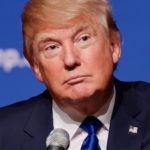Despite the indelible stain of his impeachment, the Senate, to no one’s surprise, acquitted Donald Trump. They found that their “chosen one” committed no offence to the Constitution. Claiming that he did nothing “impeachable,” the senators completed a coronation.
The Senate Republicans behaved as though they had a duty to acquit. They just would not be bothered by any new testimony or documents that might have revealed more of the truth and delayed the enthronement.
The newly-blessed King Donald has launched a vigorous campaign of vengeance against those he deems insubordinate or disloyal. He has branded all political opposition as “horrible” and “vicious” – oddly casting the king as whiner. The acquittal has confirmed his belief that there is no effective check on his power. He can (and will) run the nation even further into the mud.
While the acquittal is awful, conviction might well have been worse. It would have meant the elevation of Mike Pence, Vice-President and Supreme Sycophant. It would have been the birth of the legend of the Martyrdom of Trump, a legend that would have haunted the nation for a hundred years (assuming the union would survive so long).
We are left with a battered nation, an imperfect Union, and with the gutting of domestic Tranquility. The Blessings of Liberty are unfulfilled for ourselves and our Posterity. We are insecure in our freedom, and our politics is vulnerable to foreign intrigue and interference.
I am ashamed to leave this nation to my child and to the children of my generation. We can do better. I know this because I have seen it in my lifetime.
One odious man has single-handedly shredded all of the progress I thought we had made as a country while I have been alive.
It is an election year. There is a possibility for change.
After the Framers signed the Constitution on September 17, 1787, the long process of ratification began. I have been reading Kevin Gutzman’s James Madison and the Making of America. In the book, he describes Virginia’s ratification debate, the Richmond Convention, which opened on June 2, 1788 and finally approved the Constitution on June 25 by a vote of 89 to 79. Virginia became the tenth state to ratify.
Four days before the vote, Madison had addressed the convention on the issue of Congressional power. Opponents of ratification were concerned, in Madison’s words, that “the General Legislature will do every mischief they possibly can…and will omit to do every good which they are authorised to do.”
Madison countered with the idea that the people would choose virtuous leaders to be their representatives:
“I go on this great republican principle that the people will have virtue and intelligence to select men of virtue and wisdom. Is there no virtue among us? – If there be not, we are in a wretched situation. No theoretical checks – no form of Government, can render us secure. To suppose that any form of Government will secure liberty or happiness without any virtue in the people, is a chimerical idea…. So that we do not depend on their virtue, or put confidence in our rulers, but in the people who are to choose them.”
It was beyond the imagination of Madison and his contemporaries that the people would choose to elect a king and a king’s court of enablers in the Senate. After all, the people had only recently declared their independence from the British monarch and had fought a war to secure that independence. It must have seemed obvious to trust the people’s virtue and intelligence in selecting their leaders, and yet it now seems a glaring flaw in our Constitutional democracy.
In Philadelphia, before the vote that created the Constitution, an aging Benjamin Franklin told the delegates that he didn’t approve of parts of the document but that he would “agree to this Constitution with all its faults.” He doubted whether a better one could be made. He gave his consent to the Constitution, he said, “because I expect no better, and because I am not sure that it is not the best.”
Madison too understood that the Constitution might be flawed but that no form of government could secure liberty or happiness.
Every political election since ratification has been a test of the virtue and intelligence of the voters. This year will be no different. No election could be more important.
Views: 0
Some other stuff for later,
- 51
- 51On Tuesday night, November 9, 2016, Donald Trump was elected to be the forty-fifth president of the United States. Although more people voted for Hillary Clinton (she is ahead by 786,000 as of this writing*), Trump has won where it counts, in the Electoral College, which will formally vote on…
- 49A rally for Donald Trump at the University of Illinois at Chicago was cancelled two weeks ago. At the rally, it has been reported, “hundreds” of protesters showed up at the 9,500-seat arena, and exercised their First Amendment right to freedom of speech as thousands of supporters awaited the candidate’s…

Comments of Late